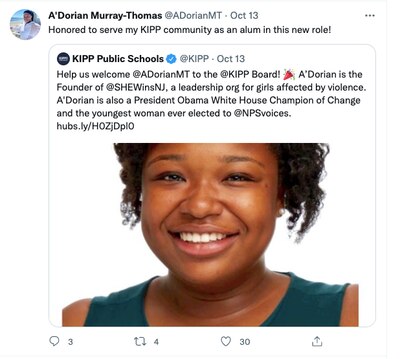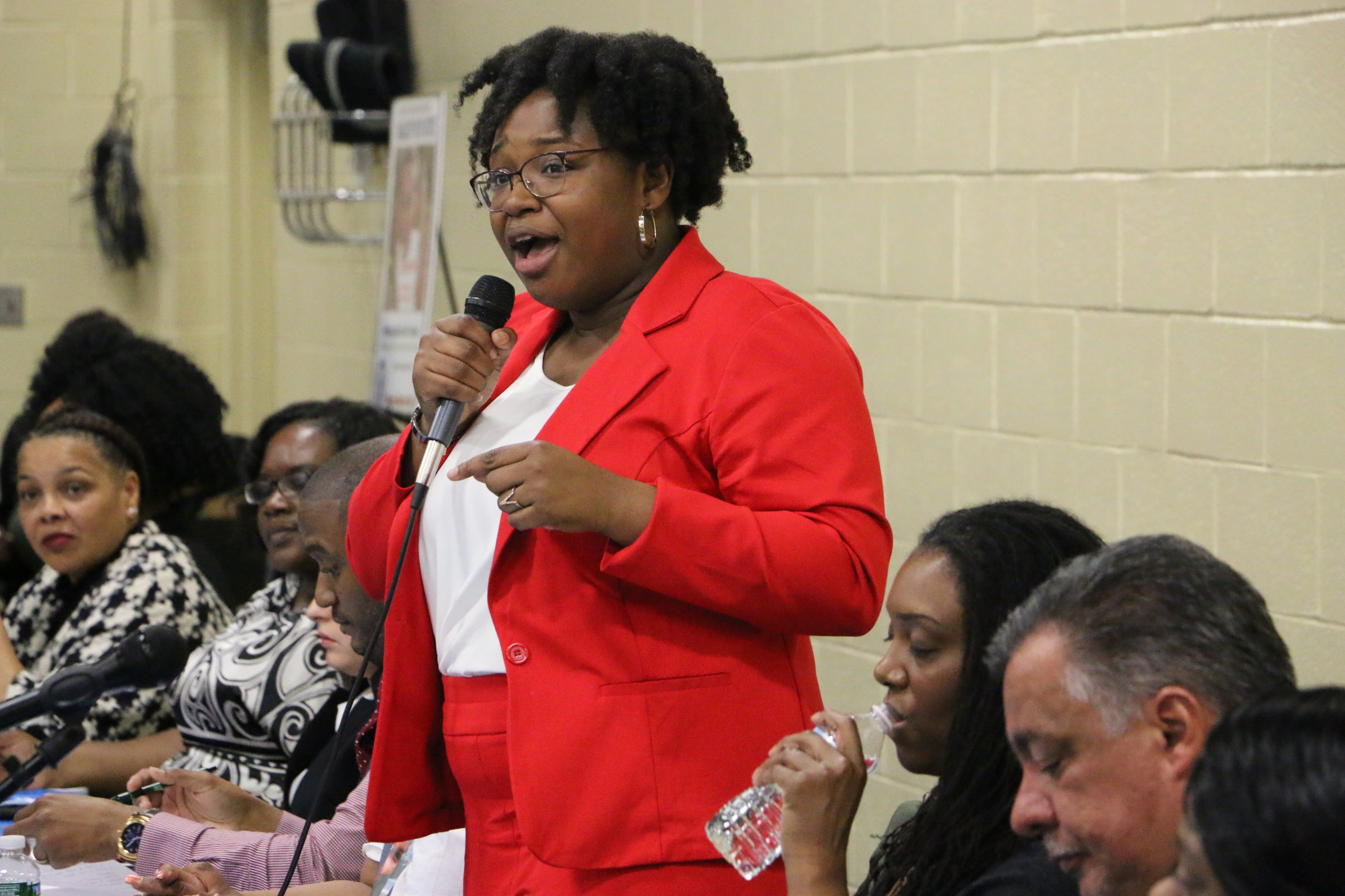A Newark school board member is facing questions about a potential conflict of interest after she was offered a spot on the board of an organization that supports KIPP charter schools across the country, including in Newark.
A’Dorian Murray-Thomas, a Newark school board member who attended a KIPP charter middle school, recently was selected to join the board of directors of the KIPP Foundation, a nonprofit that assists KIPP charter schools through training and fundraising. The board position is reserved for KIPP alumni.
KIPP is one of Newark’s largest charter school operators, with 14 campuses and more than 5,000 students. Newark’s elected school board has clashed with KIPP and other charter schools in recent years: The board is involved in an ongoing legal battle over a former district building that now houses a KIPP elementary school, and it joined a lawsuit arguing that KIPP and other charter schools worsen racial segregation and sap district resources.
Murray-Thomas said Tuesday that she has not started serving on the KIPP Foundation board, but that doing so would not create a conflict because the organization is not involved in school-level decisions.

But some Newark education advocates, including the teachers union president, say that Murray-Thomas serving on both boards would represent a clear conflict of interest as the Newark school board makes decisions that directly affect KIPP charter schools.
“She can’t be on two boards,” said Yolanda Johnson, a Newark parent organizer who called on Murray-Thomas to step down from one of her board roles.
Johnson added that she greatly respects Murray-Thomas, who founded SHE Wins Inc., a nonprofit that helps prepare Newark girls to attend college and become civic leaders. Johnson also said she voted for Murray-Thomas in 2019, when the then-23-year-old became the youngest woman elected to the Newark school board. (She is up for reelection in April.)
But, Johnson said, Newark Public School families might question Murray-Thomas’s motivations and decisions if she also serves on the KIPP Foundation board.
“Her sole interest sitting on our board should be for us,” said Johnson, whose daughter attends a district school.
In a brief interview Tuesday, Murray-Thomas said she is deeply committed to her role as a Newark school board member.
“Anyone who follows education in Newark knows that there is no question that I’ve been consistently and fully committed to the work here as a board member,” she said, noting her support for more inclusive textbooks, a revamped Black history curriculum, and a student role in district policy-making.
Asked about a potential conflict of interest, or the appearance of one, she said the KIPP Foundation is not directly involved in school operations or contracts. “There’s nothing that would put me in direct conflict,” she said.
The KIPP Foundation lists Murray-Thomas as a board member on its website, and KIPP welcomed her to its board in a recent Twitter post. But Murray-Thomas said Tuesday that she has not actually started serving on KIPP’s board.
“I’m only serving on one board,” she said, adding that her goal is to continue “serving in the best interest of Newark children and families.”
With more than 120,000 students across 20 states and Washington, D.C., KIPP is the country’s largest network of nonprofit charter schools. The schools are grouped into geographic regions, including KIPP New Jersey, run by separate boards and leaders. As charter schools, they receive public funding and operate independently of traditional school systems.
The KIPP Foundation supports schools across all regions by training school leaders, sharing instructional resources, and raising money for programs, including one that helps former KIPP students navigate college. The foundation’s 17-member board of directors designates one seat for a KIPP alum. (KIPP Foundation board member Emma Bloomberg has donated to Chalkbeat, and board member Carrie Walton Penner is a trustee of the Walton Family Foundation, another Chalkbeat donor.)
Alumni have to apply for the position, which entails a three-year term on the board, service on a board committee, and attendance at the board’s four annual meetings, according to a KIPP document. The volunteer position is unpaid, but KIPP covers travel and lodging for meetings, and board members are “encouraged” to make a financial contribution to KIPP.
The Newark Board of Education’s bylaws state that members should avoid actions that could prompt questions about “the integrity of any board decision.” They also cite state law, which says board members should not take paid or volunteer positions that “might reasonably be expected to prejudice” their official decisions.
Some community members contacted Dawn Haynes, president of the Newark school board, to voice concerns about Murray-Thomas’ appointment to the KIPP board. John Abeigon, president of the Newark Teachers Union, weighed in on Facebook, posting a line from the Bible that says no one can “serve two masters.”
Haynes did not respond to a request for comment Tuesday.
In general, board members should consult legal experts if questions arise about potential conflicts of interest, said Carrie Chimerine Irvin, CEO and founder of Education Board Partners, which advises charter schools and education-focused nonprofits. Serving on more than one board does not automatically create a conflict, and proper disclosure and recusal from certain decisions can often resolve potential conflicts, she added, speaking generally and not about the situation in Newark.
“People serve on multiple boards all the time,” she said.






